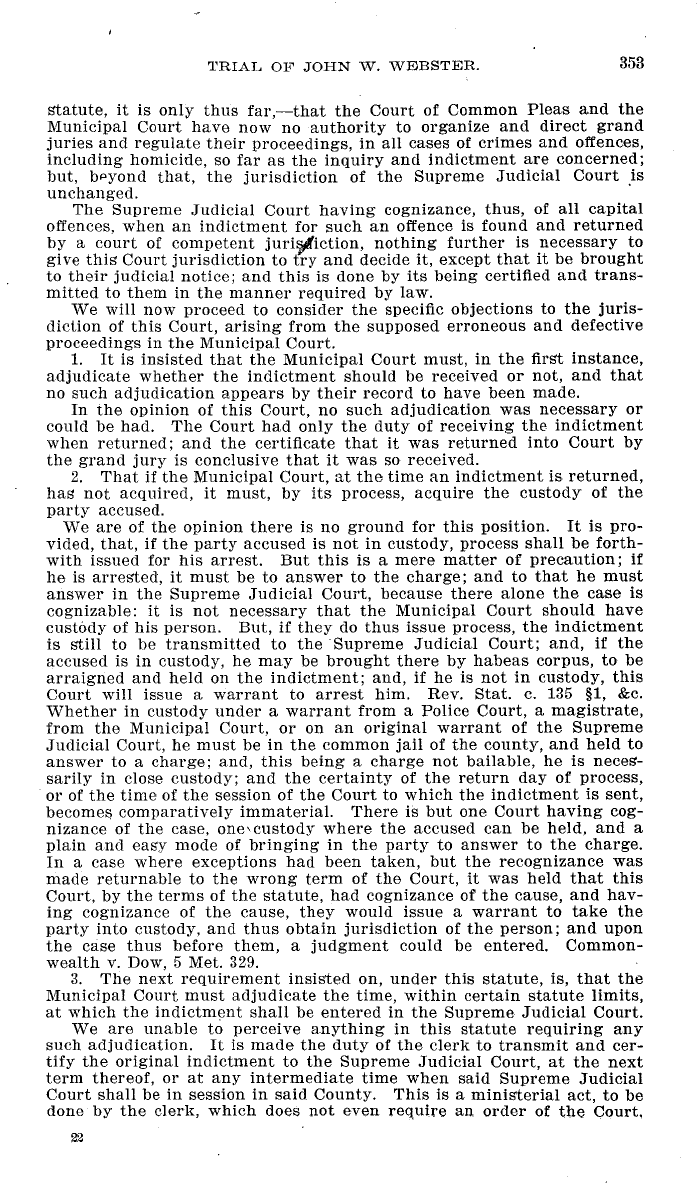|
TRIAL OF JOHN W. WFMSTER. 353
statute, it is only thus far,-that the Court of Common Pleas and the
Municipal Court have now no authority to organize and direct grand
juries and regulate their proceedings, in all cases of crimes and offences,
including homicide, so far as the inquiry and indictment are concerned;
but, beyond that, the jurisdiction of the Supreme Judicial Court is
unchanged.
The Supreme Judicial Court having cognizance, thus, of all capital
offences, when an indictment for such an offence is found and returned
by a court of competent juri~l`iction nothing further is necessary to
give this Court jurisdiction to try and decide it, except that it be brought
to their judicial notice; and this is done by its being certified and trans-
mitted to them in the manner required by law.
We will now proceed to consider the specific objections to the juris-
diction of this Court, arising from the supposed erroneous and defective
proceedings in the Municipal Court.
1. It is insisted that the Municipal Court must, in the first instance,
adjudicate whether the indictment should be received or not, and that
no such adjudication appears by their record to have been made.
In the opinion of this Court, no such adjudication was necessary or
could be had. The Court had only the duty of receiving the indictment
when returned; and the certificate that it was returned into Court by
the grand jury is conclusive that it was so received.
2. That if the Municipal Court, at the time an indictment is returned,
has not acquired, it must, by its process, acquire the custody of the
party accused.
We are of the opinion there is no ground for this position. It is pro-
vided, that, if the party accused is not in custody, process shall be forth-
with issued for his arrest. But this is a mere matter of precaution; if
he is arrested, it must be to answer to the charge; and to that he must
answer in the Supreme Judicial Court, because there alone the case is
cognizable: it is not necessary that the Municipal Court should have
custody of his person. But, if they do thus issue process, the indictment
is still to be, transmitted to the Supreme Judicial Court; and, if the
accused is in custody, he may be brought there by habeas corpus, to be
arraigned and held on the indictment; and, if he is not in custody, this
Court will issue a warrant to arrest him. Rev. Stat. c. 135 §1, &c.
Whether in custody under a warrant from a Police Court, a magistrate,
from the Municipal Court, or on an original warrant of the Supreme
Judicial Court, he must be in the common jail of the county, and held to
answer to a charge; and, this being a charge not bailable, he is neces-
sarily in close custody; and the certainty of the return day of process,
or of the time of the session of the Court to which the indictment is sent,
becomes comparatively immaterial. There is but one Court having cog-
nizance of the case, one,custody where the accused can be held, and a
plain and easy mode of bringing in the party to answer to the charge.
In a case where exceptions had been taken, but the recognizance was
made returnable to the wrong term of the Court, it was held that this
Court, by the terms of the statute, had cognizance of the cause, and hav-
ing cognizance of the cause, they would issue a warrant to take the
party into custody, and thus obtain jurisdiction of the person; and upon
the case thus before them, a judgment could be entered. Common-
wealth v. Dow, 5 Met. 329.
3. The next requirement insisted on, under this statute, is, that the
Municipal Court must adjudicate the time, within certain statute limits,
at which the indictment shall be entered in the Supreme Judicial Court.
We are unable to perceive anything in this statute requiring any
such adjudication. It is made the duty of the clerk to transmit and cer-
tify the original indictment to the Supreme Judicial Court, at the next
term thereof, or at any intermediate time when said Supreme Judicial
Court shall be in session in said County. This is a ministerial act, to be
done by the clerk, which does not even require an order of the Court,
22
|

